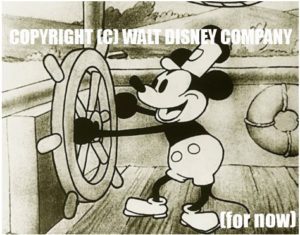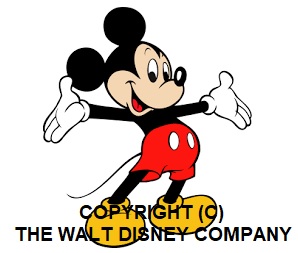In January 2024, Mickey Mouse will enter the public domain. That’s when Disney’s copyright on the character expires, and he legally becomes public property. That means that creative people can do what they like with him, and not be subject to the fury of the Walt Disney Company. For over 90 years, Disney has jealously guarded Mickey against being borrowed, copied, or displayed in any way not associated with the company or its projects. But come 2024, that all ends, because Mickey Mouse will enter the public domain.
Now, to be clear, the Mickey who you will be able to make your own animations about, or print on t-shirts, or whatever it is you want to do, is the one who made his first public appearance in October of 1928 in the animated short, “Steamboat Willie.” He looks like this:

Recognizably Mickey, but a little more rodent-like, a little less slick and polished, than the Mickey we know today:

17 U.S. Code § 302 states that “In the case of an anonymous work, a pseudonymous work, or a work made for hire, the copyright endures for a term of 95 years from the year of its first publication, or a term of 120 years from the year of its creation, whichever expires first.” Now, whether or not Mickey is an anonymous or pseudonymous work may be debateable, but it doesn’t really matter, because Congress saved Mickey a long time ago.
Back in 1998, when Disney’s existing copyright on Mickey Mouse was about to expire, Congress stepped in and passed the “Sonny Bono Copyright Term Extension Act,” which changed the copyright extension period for “pre-1978 works still in original or renewal copyright term: to “95 years from original copyright date,” basically adding another 25 years to Disney’s copyright on Mickey. But unless Congress acts to extend Mickey’s protection period again (which seems unlikely, given the current inability of Congress to agree on whether or not to take a lunch break, much less what to order for lunch), in a couple years you will be free to put Steamboat Willie Mickey on t-shirts, to make Steamboat Willie Mickey movies, or write Steamboat Willie Mickey comics. Keep in mind, though, that Disney will undoubtedly be examining any pubic domain uses for the slightest hint of the still-protected Mickey, so be very very careful.
Disney has some reason to be concerned, of course, because “pubic domain” means the public is free to do stuff with the previously-protected work. Just this year, for instance, Winnie the Pooh entered the public domain (that is, the 1926 A.A. Milne books entered public domain; the 1966 Disney cartoon based on a licensed use of the Milne books is still protected by copyright). Almost immediately, a film-maker announced his intention to produce Winnie the Pooh: Blood and Honey, a slasher/horror movie in which a feral Pooh and Piglet rampage across the countryside committing various acts of mayhem and bloodshed in a most un-Disney way. So come 2024, don’t be surprised to see Steamboat Willie Mickey’s adventures in something pornographic, blood-soaked, drugs-and-alchohol-fueled. Because Mickey Mouse will enter the public domain, and that’s apparently what we do.
To learn more about copyright law, public domain, and what creative people can do to protect themselves, check out Copyright for Creatives.
References